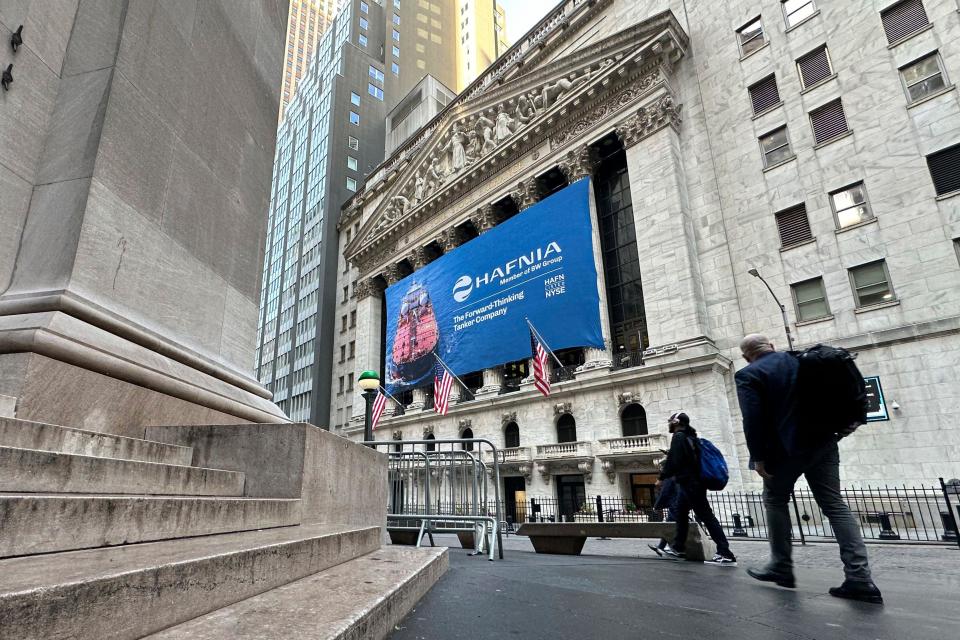European stocks push higher ahead of key US inflation report


The FTSE (^FTSE) and European stocks were higher on Wednesday as as bull traders defended support levels and awaited the data on the latest US inflation report.
The CPI rate is expected to show a small increase in the pace of price rises this afternoon, rising from 3.1% to 3.4%. However, core inflation could slow slightly from 3.8% to 3.7%.
EU benchmarks were led higher by most sectors. Producer manufacturing, transportation and especially tech stocks have brought the best performances so far.
-
London’s benchmark index was 0.6% higher in afternoon trade
-
Germany’s DAX (^GDAXI) rose 0.8% and the CAC (^FCHI) in Paris headed 0.5% into the green
-
The pan-European STOXX 600 (^STOXX) was up 0.6% during the session
-
Wall Street is set to open higher as S&P 500 futures (ES=F), Dow futures (YM=F) and Nasdaq futures (NQ=F) were all in the green
-
Tesco (TSCO.L) climbed 4% as profits rose by almost 160%
Read more: Trending tickers: Tesco, TSMC, Gold, M&C Saatchi
Dan Coatsworth, investment analyst at AJ Bell, said: “The central bank wants to see sustained evidence of inflation coming down and that doesn’t appear to be on the menu. The signs are clear for investors to see, but many have been choosing to ignore them.
“The Fed putting it into black and white could be a difficult pill for investors to swallow, so brace yourself for turbulence on the market this week.”
Follow along for live updates throughout the day:
Live12 updates
-
UK homeowners renting out rooms amid high mortgage rates

UK homeowners are renting out a room in their house as a way of making some extra money amid the cost of living crisis that has pushed mortgage rates to record highs.
Over one in every 10 (12%) London homeowners have started renting out a room in their house in the past year to generate additional income, according to Barclays Consumer Spend report.
The trend is not exclusive to the capital, as some 3% of homeowners across the UK have also rented out a room in their property to make a bit more money.
UK homeowners have been particularly hit by cost of living woes, with the average rate on a two-year fixed deal currently stands at 5.74%, while for a five-year deal, rates are around 5.24%, according to figures from Uswitch.
Borrowers would need to spread their home loans over more than 70 years to be able to afford the same mortgages on offer just two years ago, banks have said.
-
Gold continues to shine
Gold continued to shine on Wednesday, with prices up 0.3% during the session, after a near-20% surge since mid-February.
It comes as the gains have been fuelled by expectations that the US Federal Reserve will lower interest rates this year, as well as the ongoing conflict in the Middle East and Ukraine.
In New York’s Comex gold futures market, money managers are placing more bullish bets on gold, with net long positions rising to near four-year high in the week ending 2 April.
Meanwhile, purchases by central banks totalled more than 1,000 tons in 2022 and 2023 with much of that led by economies, particularly China, where efforts to diversify away from the dollar have accelerated.
Ricardo Evangelista, senior analyst at ActivTrades, said:
“Gold prices edged up during early Wednesday trading, defying the uncertainty surrounding the impending release of US inflation data later today.”
“All eyes in the financial markets are fixed on the forthcoming publication of the March US Consumer Price Index figures, anticipated to reveal persistent inflationary pressures in the world’s largest economy. Following last week’s strong non-farm payrolls report, which underscored the resilience of the US economy, a robust inflation reading would further bolster the case for the Federal Reserve to prolong its high interest rate stance.”
“Such an outcome could trigger an uptick in treasury yields and strengthen the dollar, potentially dampening the allure of gold; nevertheless, the precious metal continues to enjoy strong demand amidst geopolitical instability, uncertainties surrounding the global economic landscape, and substantial central bank acquisitions, factors that are likely to anchor bullion prices near current levels.”
-
Boeing deliveries fall by half in March
Boeing delivered just 29 airplanes in March, compared to the 64 delivered in the same month a year ago, as 737 MAX production slipped on increased quality checks and audits by regulators.
It is producing fewer MAX single-aisle jets to improve manufacturing quality after the mid-air blowout of a door plug on a 737 MAX 9 jet brought increased scrutiny from regulators.
Boeing’s monthly output rate fell as low as single digits in late March, well below a Federal Aviation Administration-imposed (FAA) cap of 38 jets a month, Reuters reported.
During the first three months of 2024, the firm handed over 83 airplanes to customers, including 66 MAX jets, down from a total 130 airplane deliveries during the first quarter of 2023.
“We’re deliberately going to slow to get this right,” Boeing Chief Financial Officer Brian West told a Bank of America conference last month. “We are the ones who made the decision to constrain rates on the 737 program below 38 per month until we feel like we’re ready.”
Boeing said it delivered eight MAX jets to Chinese operators in March. China resumed MAX deliveries in January.
-
BMW sees EV sales surge
BMW sold 28% more electric vehicles in the first three months of the year it has been revealed.
The German carmaker saw deliveries of models such as i4, iX1 and i7 rise by 41%, offering a glimpse of hope for the battered European EV sector.
It comes as other manufacturers have seen global sales plummet at the start of 2024 thanks to high interest rates and Red Sea shipping disruption.
-
Coinbase introduces Apple Pay to app

Photo by: STRF/STAR MAX/IPx 2021 6/2/21 Coinbase to launch its Coinbase Card on Apple Pay and Google Pay. STAR MAX Photo: Apple Pay, coinbase and Google Pay logos photographed on multiple iPhone devices. (STRF/STAR MAX/IPx, Associated Press) UK Coinbase users can now use Apple Pay to buy Bitcoin, Ethereum and other digital assets made available online and within the app.
Daniel Seifert, Country Director for the UK and Vice President, EMEA at Coinbase said:
“We are extremely proud to announce our UK users can now use Apple Pay to make easy, secure and private purchases online and in-app, helping us in our goal of increasing accessibility to digital assets in the UK.
We know users already love using Apple Pay in their daily lives, so it only made sense to bring this convenient way to pay to Coinbase as well.”
It comes as more than 6 million UK adults currently own cryptocurrency. By lowering the barriers to entry to the digital asset market, Coinbase is aiming to increase this number throughout 2024 and beyond.
-
Baby boomers coping best with higher bills
According to the Financial Conduct Authority (FCA), baby boomers have coped best with the cost of living squeeze.
It comes as 7.4 million UK adults are still struggling to pay bills due to the high cost of living.
Although this number has fallen from last year, many households still feel “heavily burdened”.
The city watchdog said over-75s were most likely to say they were coping well with daily financial pressures, while those aged under 44 were most likely to say they were struggling.
Its survey suggested that one in nine adults (5.5 million people) had missed a bill or credit payment in the six months to January 2024.
Meanwhile, one in nine people also had no disposable income.
Sheldon Mills, the FCA’s executive director of consumers and competition, said:
“Our research shows many people are still struggling with their bills, though it is encouraging to see some benefiting from the help that’s available.”
-
Unite accuses Tesco of profiteering
Not everyone is happy about Tesco’s bumper profits today, with Unite the Union slamming the company amid a cost of living crisis.
Sharon Graham, Unite general secretary, said:
“Tesco is raking in mountains of cash while families struggle to put food on the table because of sky high prices. Many companies have used the cost-of-living crisis to grab excessive profits.
“There is an epidemic of profiteering in our economy – the government has been missing in action and failed to curb it.”
-
Tesco profits soar 160%

Exterior view of a UK Tesco superstore (supermarket) with parked cars in the outdoor car park. (Lee Hudson) Tesco (TSCO.L) shares climbed as much as 1% in London on Wednesday after it revealed a 160% rise in pre-tax profits, soaring from 882m in 2022 to £2.3bn.
Sales at Britain’s largest supermarket rose by 4.4% to £68.2bn in the year to 24 February while more than 4,000 products were cheaper at the end of the year, with an average price cut of around 12%.
It is now expecting retail adjusted operating profit of at least £2.8bn in 2024-25.
Tesco also predicted that food inflation will stabilise in low single digits for the rest of the year, as it plans to make £500m in efficiency savings in the year ahead.
Retail adjusted operating profit, which excludes results from Tesco Bank, rose 10.9% to £2.76bn.
“Inflationary pressures have lessened substantially, however we are conscious that things are still difficult for many customers, so we have worked hard to reduce prices and have now been the cheapest full-line grocer for well over a year,” said Ken Murphy, chief executive.
“We have continued to invest in helping customers where it matters most, cutting prices on more than 4,000 products and doubling down on our powerful combination of Aldi Price Match, Low Everyday Prices and Clubcard Prices.”
-
Traders awaiting US inflation report
Traders are looking ahead to the latest US inflation report due out this afternoon.
The CPI rate is expected to show a small increase in the pace of price rises, increasing from 3.1% to 3.4%. However, core inflation could slow slightly from 3.8% to 3.7%.
Dan Coatsworth, investment analyst at AJ Bell, said:
The central bank wants to see sustained evidence of inflation coming down and that doesn’t appear to be on the menu. The signs are clear for investors to see, but many have been choosing to ignore them.
The Fed putting it into black and white could be a difficult pill for investors to swallow, so brace yourself for turbulence on the market this week.”
-
Fitch downgrades China outlook to negative

A woman reacts near a dragon sculpture outside a restaurant in Beijing, Tuesday, April 9, 2024. China’s Finance Ministry has denounced a report by Fitch Ratings that kept its sovereign debt rated at A+ but downgraded its outlook to negative, saying in a statement that China’s deficit is at a moderate and reasonable level and risks are under control. (AP Photo/Ng Han Guan) (Ng Han Guan, Associated Press) Fitch has downgraded its long-term outlook on China to negative while maintaining the country’s A+ credit rating.
The US-based rating agency said the adjustment was driven by the country’s bealeagured property sector, which has introduced increased uncertainty.
Fitch predicted a rise in the general government deficit to 7.1% of GDP in 2024 from 5.8% in 2023, marking the highest level since 2020 when China’s strict COVID measures had a significant impact on the economy.
The press release said:
“Fitch believes that fiscal policy is increasingly likely to play an important role in supporting growth in the coming years which could keep debt on a steady upward trend. Contingent liability risks may also be rising, as lower nominal growth exacerbates challenges to managing high economy-wide leverage.”
Despite the revised outlook, Fitch affirmed China’s IDR rating at ‘A+’, suggesting a potential downgrade in the medium term.
-
Asia and US stocks
Stocks in Asia were mixed overnight with the Nikkei (^N225) down 0.5% on the day in Japan, and the Hang Seng (^HSI) rising 1.8% in Hong Kong. The Shanghai Composite (000001.SS) was 0.7% lower by the end of the session.
Across the pond on Wall Street, the S&P 500 (^GSPC) edged up by 0.1% to 5,209.91 after barely moving the day before.
Meanwhile, the Dow Jones Industrial Average (^DJI) slipped less than 0.1% to 38,883.67, and the tech-heacy Nasdaq Composite (^IXIC) rose 0.3% to 16,306.64.
Treasury yields eased in the bond market ahead of Wednesday’s key US inflation report. The yield on benchmark 10-year US Treasury bonds dipped to 4.35% from 4.42% late on Monday.
-
Coming up…
Good morning, and welcome to our live markets blog. As usual we will be covering what’s moving markets, and what’s happening across the global economy.
Here’s a quick look at what’s on the agenda for today:
-
7am: Trading updates: Tesco, M&C Saatchi
-
7am: Sweden’s GDP report for February
-
12pm: US weekly mortgage applications
-
1.30pm: US inflation report for March
-
2.45pm: Bank of Canada interest rate decision
-
7pm: US FOMC Interest Rate Minutes
-
Watch: What is a recession and how do we spot one?
Download the Yahoo Finance app, available for Apple and Android






